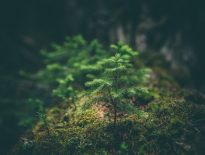The weather today is foul. The earth seems to have taken a dreadful turn. Life is tinged with an inert kind of sorrow. The devil must be working overtime this June. My mind is going awry. There is so much doom and gloom in my head and heart.
She winces at the light bulb’s glare. Her eyes are now like embers of coal; they bear no reflection of a soul. She shudders, then expires.
Heaven could not wait.
My eyelids turn heavy, my heart becomes hollow and my blood feels like acid. Obilo is gone. Most of my heroes are either dysfunctional or dead. She had been at death’s door for a while but I was not prepared to let her go. One is never at ease with the fickleness of existence.
Obilo was larger than life. She was beyond love. Ahead of her time yet still on time. She had a demeanour that lit up a room. Always wreathed in a beautiful wrinkly smile; her face radiated beams of light when she smiled as if it was the map of her life! She was soulful – she saw love, smelt achievement, and heard a smile. A woman of statuesque beauty and exquisite strength, as alpha as they come.
Self-conscious, intuitive, advocative, sweet, and now peaceful and free as a dove. Your typical African grandmother, and such, had some of the obligatory traits – spontaneous deafness, an unerring ability to stand right in the way, and a bat-like sonar system that allowed her to scream out your name at the top of her lungs when you left one dish undone, but stood ten toes down when she did the same.
A birth giver to stars. A magic maker. A game changer. A queen. She had children, grandchildren, and great-grandchildren who would keep her on her toes – a wild ride to places she had perhaps only heard of on the radio. But I saw something striking in her liquid eyes, something that guided me from the moment I met her – her unflappable philosophy that whatever came her way she would overcome. And because she would overcome, I would, too.
She loved God. Obilo loved God authentically. She regarded Him as a friend. My faith had perhaps been convoluted, her illness had somehow shifted my image of divinity from that childhood vision, but the simplicity of her prayers still lingers. And so does something she told me when I asked her where God lived. With her signature broad smile and a laid-back tone but somewhat cogent, she replied, “In your heart.”
I wish I did not often act as-though God was a figurine on the mantle or could fit in my back pocket. The war between my mind and heart was epic.
The good old days with her were wholesome. Peopled with warmth and wonder. Too often, I found myself reliving those seamless conversations from my childhood, in my head. She had a flair for storytelling. My fondest memories of her stories was one of Muok, a legendary man whose murder at the pinnacle of his career shook the nation. The man who had charmed the world with his messianic oration.
Jowi, another man, the oracle who lived way before his time, was another of her stories. If one knew her, one would instantly remember Kej Dede, the famine that had mercilessly ravished them and left their souls riddled with scars of survival, pain, and loss. With remarkable disdain, she talked about Chombo, the man made of staggering brutality. Chombo ruled Nyumbani, a country of some millions of people, like his warehouse. He killed at will. He banished the lucky and butchered the rest. Most times, unprovoked. During Kej Dede, Chombo had already been ousted from power and two other men had tried to succeed him unsuccessfully. A third one was warming up. They said he was from the bush, and that just like Chombo, he too could speak Kiswahili fluently. It was also said that the people were pregnant with hope and expectation. I later lived among this great citizenry during my teenage years. I could tell that hope and expectation remained. Occasionally radicalised with vigilance.
This brand of men, Obilo said, had a special affinity for women. They had all types of children by all types of men. Those who know will tell you that those women were mostly anything but dark-skinned.
These men treated the presidency like kingship, like their birthright. Only death could dethrone them. There was a country that was ruled by a father, deputised by his son. This father had violently succeeded his uncle years ago. Pop culture glorified it, terming it a coup that was begging to be orchestrated. Coups and military regimes and curfews were common words in my history class. These countries followed a system of government called democracy, invented by Jakalam. It was invented by brothers of Jakalam from a far away land named Huntville.
Jakalam was a native of Huntsville. Huntsville, Obilo articulated, experienced very strange weather patterns. The most adverse of them akin to the inside of a deep freezer. They said the natives of Huntsville were civilised. When you visited Huntsville you returned with polished English, the kind that came through the nostrils. You learnt how to dine and dance with etiquette. You learnt how to dance with rhythm. Poverty would be history. You would never know oppression. You gained an instant allure; everyone wanted to hobnob with you. Yet one needed a piece of paper called a passport, and a whole lot of cash to embark on that journey to salvation. It costed an arm and a leg. Ordinarily, those two would be inadequate. You also had to undergo a thorough scrutiny to get a small sticker to validate your passport. The code word for that rigorous exercise was visa interview. How we dreamed.
Obilo’s government name was Veronica Hobble. Jakalam had baptised her as such during her Dini classes, the only formal education she ever had. Back home, that quickly got Africanised to Firnika Obilo. The Africanised version had outlived the imperialist version, seemingly. Hobble was now fondly called Obilo.
She was a descendant of the natives of one of the islands of the lake. The child of a man of great stature, a hero who had everyone by the heart. A drum major who had been felled by Jakalam’s bullet over a minor scuffle. Her kinsmen, carrying her along, had emigrated into the adjacent mainland, then further and further on. They like to say that it had something to do with population pressure and land fragmentation. Or that the kinsmen are always on the move. Folks from the mainland, she said, were modest and more submissive: children bowed to older people and women bowed to men. They were pleasantly cordial; the sugarcane and groundnut growers would gift you their produce before it got to the factories and their granaries! Their Kiswahili was rich, the kind you only experienced during the 7 o’clock news nowadays.
In high school I had concentrated more on English Literature; I wanted to create stories like Ariwa – the mercurial creature with his own unique quirk. I also wanted to end up like my countryman Mukulu; go to Makerere and leave a mark. My father liked telling me that there was a hall named Northcott, and there, great men rubbed shoulders. My mother immensely liked one Ahumuza. She said women too, like those great men, can be great. I loved words and all their nuances, connotations, and layers of meaning.
It was told that some of Obilo’s older brothers had been recruited to fight Jakalam’s war in a far-off land. It is also said that they were never seen or heard from again. And that Sirkal, through the chief’s baraza sitting in the local market under the jamna tree, had paid Obilo some twenty shillings in damages. The year was 1965.
Even when Obilo’s health deteriorated, I could still see her infused with strength and sweetness. Such days were marred by profound grief; sad as raindrops on a graveyard, bitter and unforgiving. But she carried on each day, with hope, chance, and a fresh face. Clothing her agony in grace and honing her brave spirit, she walked quietly into a new day. Another day, to her, was a metaphor for chance. At least when nothing was certain, anything, including recovery, was possible. Seeing her frail bones inked in resilience wrung tears out of my heart. I learnt to keep feigning strength each time our eyes met. Every time I watched her breath coming in gasps. Every time the road to recovery seemed anything but linear. What a woman of staggering rebound!
I learnt too late in life that by being alive, one signs up for death subconsciously. And that I am as certain of death as I am of taxes.
On the day we buried her, the heavens opened up and it poured massively. I gained a powerful ancestor.
Read – A Martian Sunrise – A Short Story by Barra Hart, Nigeria
——-
The Writers Space Africa(WSA) Magazine is published by a team of professionals and downloadable for free. If you would like to support our work, please buy us coffee – https://www.buymeacoffee.com/wsamagazine







